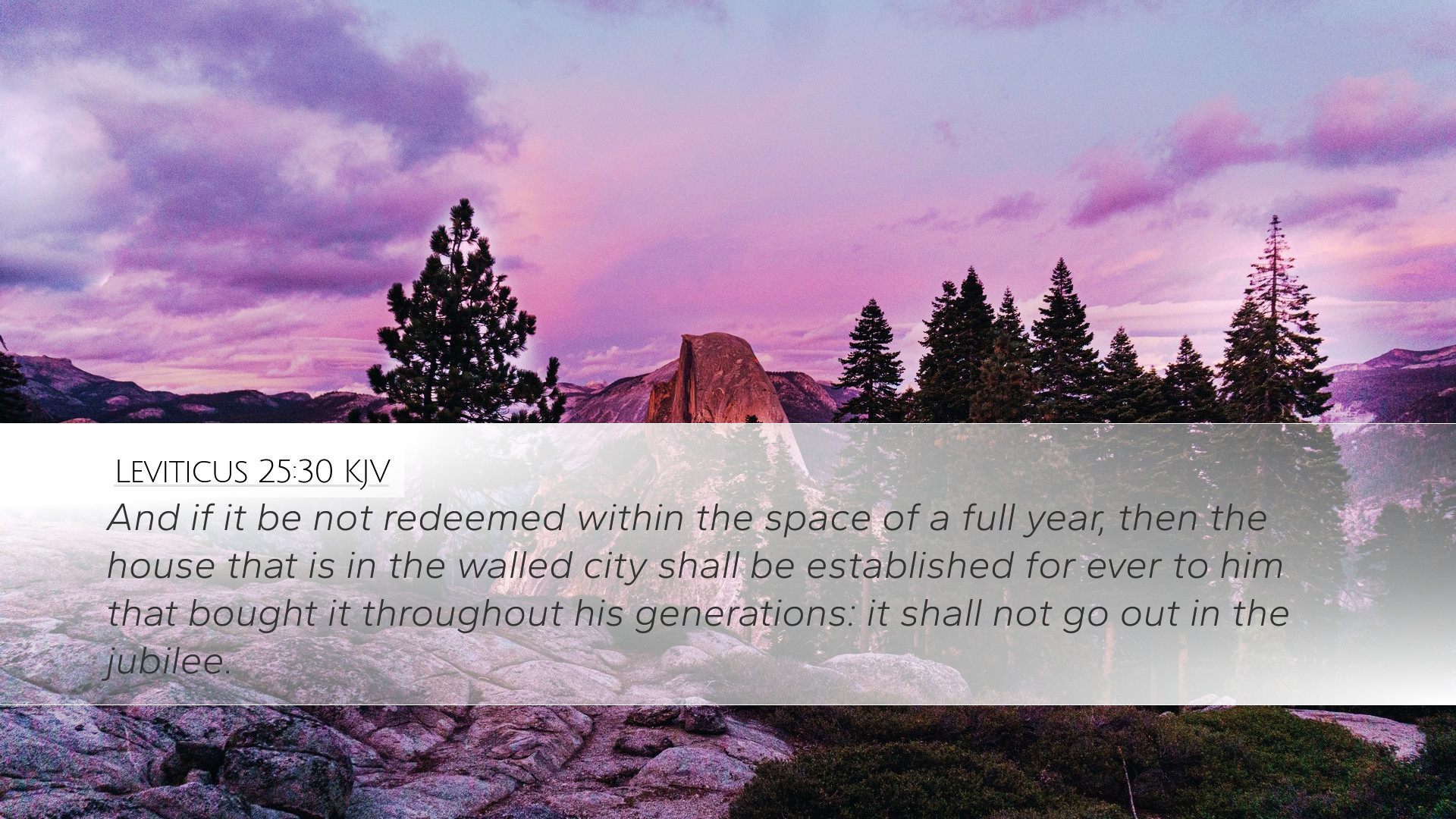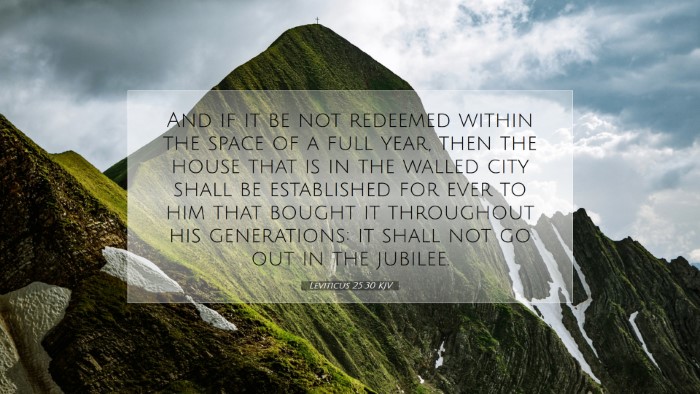Bible Commentary on Leviticus 25:30
Verse Text: "And if it be not redeemed within the space of a full year, then the house that is in the walled city shall be established forever to him that bought it throughout his generations: it shall not go out in the jubilee."
Introduction
The verse Leviticus 25:30 addresses the matter of homes in walled cities concerning the laws of redemption and jubilee. It is crucial for understanding the socio-economic fabric of ancient Israelite society and the divine principles of ownership, redemption, and restoration.
Contextual Analysis
This passage is situated within the broader context of Leviticus 25, which deals extensively with the Year of Jubilee, a time of restoration and returns. The jubilee demonstrates God's provision and establishes a mechanism for maintaining equitable distribution of land and property among the Israelite people. This divine ordinance prevented the permanent loss of one's ancestral heritage.
Public Domain Commentaries Insights
Commentators such as Matthew Henry, Albert Barnes, and Adam Clarke provide valuable perspectives on this text.
Matthew Henry's Commentary
Matthew Henry emphasizes the significance of redemption in this legislation. He notes that the right to redeem a house within a year highlights God's provision for His people, enabling them to reclaim what was lost. Henry observes that if a house in a walled city is not redeemed within a year, it becomes permanently owned by the buyer, suggesting a contrast between temporary and permanent ownership.
Henry warns of the spiritual implications of this law, interpreting it as an illustration of the soul's need for redemption. Just as a house may remain lost if not redeemed, so too can a person remain in spiritual poverty without seeking the redemption available through faith. His interpretation encourages the faithful to actively pursue redemption in a timely manner.
Albert Barnes' Commentary
Albert Barnes interprets this verse with a focus on the specifics of property laws in Israel. He notes the distinction between houses in walled cities and those in rural areas, suggesting that this provision reflects a greater social structure and urban economic dynamics.
Barnes also highlights the significance of the Jubilee year, portraying it as a time ordained by God for restoration and return. He comments that the permanence granted to the buyer after a full year acts to reinforce the principle that, in the absence of redemption, the social and economic order will retain balance, and individual property rights must be recognized with due respect.
Adam Clarke's Commentary
Adam Clarke brings forth a historical and linguistic analysis of the terms used in this verse. He indicates that the Hebrew text emphasizes the irreversible nature of the transfer of property once the year of redemption has passed. Clarke suggests that this reflects God’s sovereignty over the land and His intent to establish a just society.
Clarke further expounds on the deeper spiritual themes present in the text, noting that God establishes regulations to protect the vulnerable and marginalized in society. He demonstrates how this law reflects God's overarching concern for justice, equity, and mercy, showcasing that the law is not merely about property but also about preserving human dignity.
Theological Implications
This passage holds significant theological implications, particularly regarding the themes of redemption, justice, and the stewardship of God's provisions. These concepts resonate throughout Scripture, culminating in the understanding of Christ as the ultimate Redeemer.
- Redemption: The idea of redemption in the Old Testament is a foreshadowing of the greater redemption through Christ. The promptness of redemption reflects the urgency of salvation.
- Justice and Equity: The law provided for the poor and maintains equity within the community, illustrating God's concern for social justice.
- Restoration: The Jubilee is a principle that transcends economic systems, reminding believers of the cycle of grace and restoration available in God’s kingdom.
Practical Applications
For pastors, students, theologians, and scholars, Leviticus 25:30 presents rich opportunities for application in contemporary ministry and scholarship:
- Understanding Redemption: This verse serves as a reminder that time is of the essence in spiritual matters. Churches and ministries should emphasize the urgency of redemption through Christ.
- Advocacy for Justice: The call for justice in this passage should lead congregations to engage with social issues, advocating for those who are marginalized and ensuring fair treatment across all levels of society.
- Encouragement of Community Stewardship: Encouraging the community to view possessions as stewards rather than owners can shift perspectives on wealth, promoting generosity and support for those in need.
Conclusion
Leviticus 25:30 embodies profound theological and social principles inherent in God’s law. The insights derived from commentators enrich our understanding of scriptural mandates relating to redemption, justice, and community. As we engage with these timeless principles, may we seek to embody the heart of the law by pursuing justice and timely redemption in our lives and communities.


